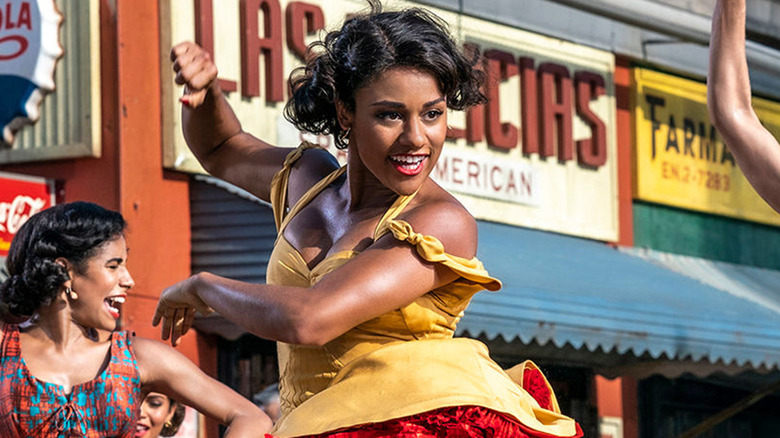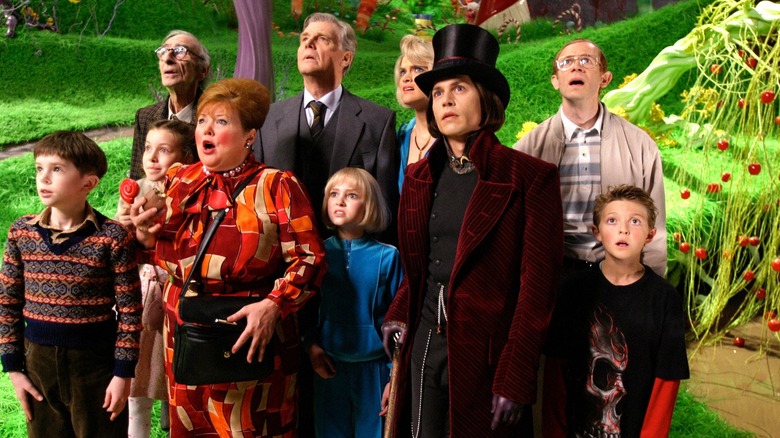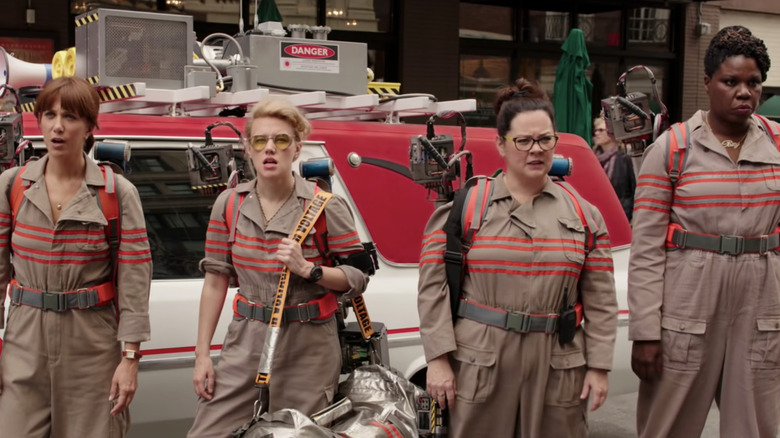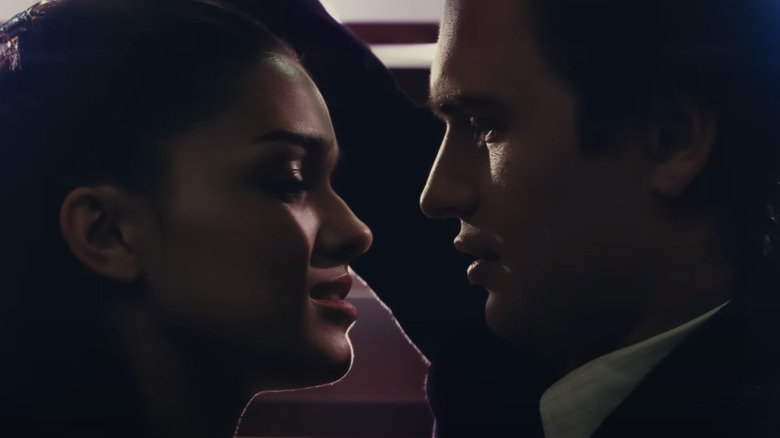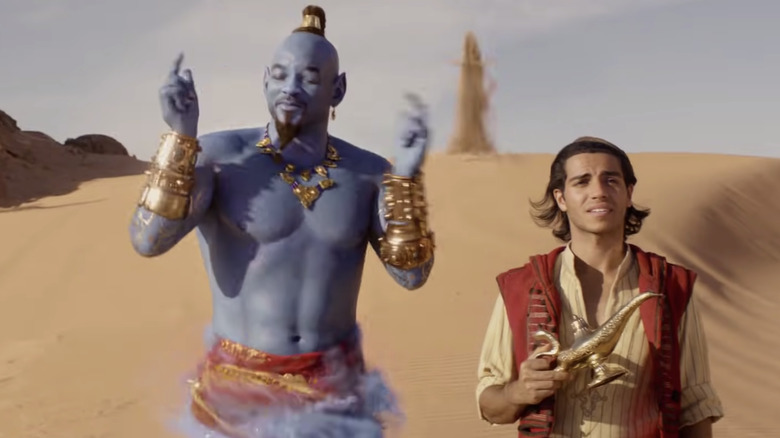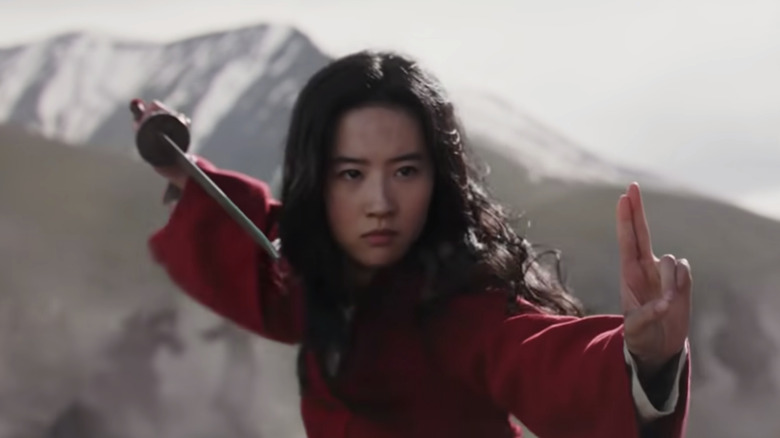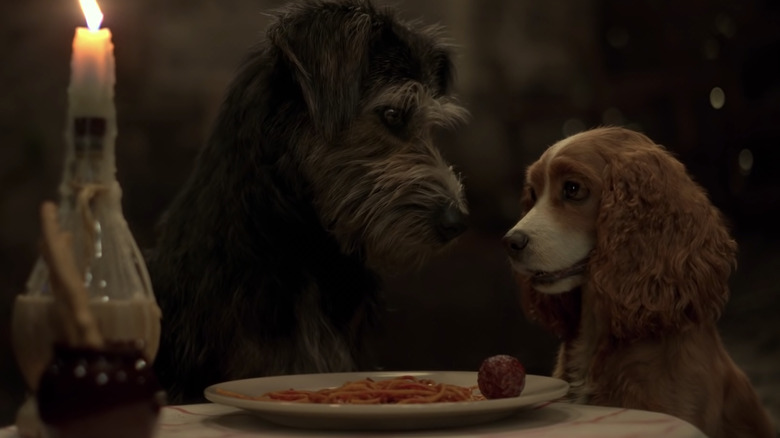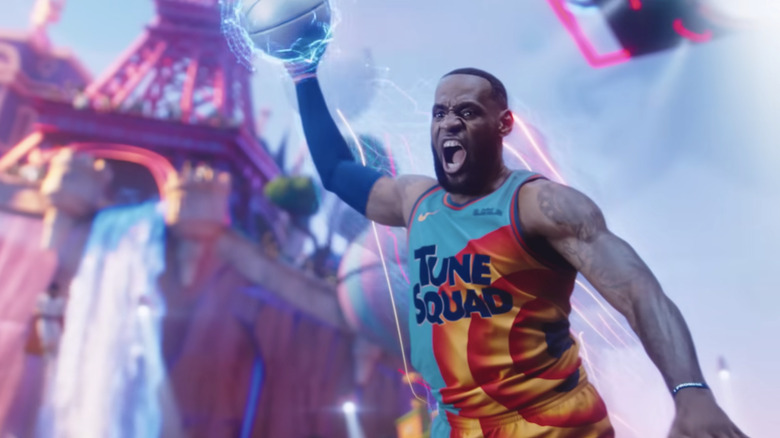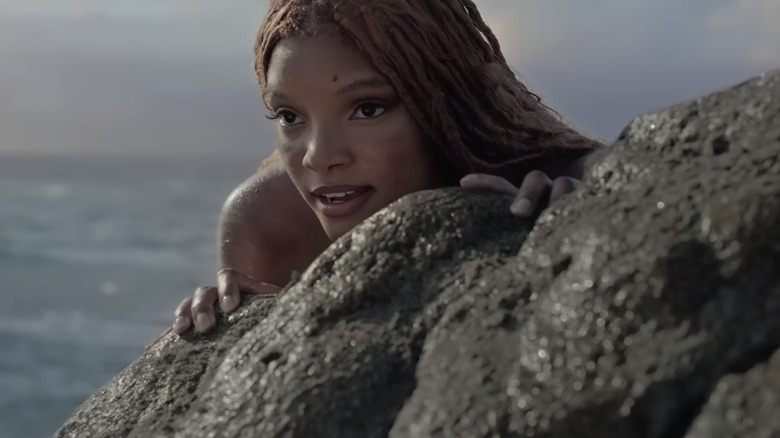Movie Songs Changed For The Remake Due To Controversy
Remakes are all the rage these days, and no movie is safe. Though retellings have been around almost as long as Hollywood itself, today there are countless remakes, reboots, and reimaginings to choose from. Everything from Paul Feig's "Ghostbusters" to Bradley Cooper's "A Star Is Born" can technically be classified as such. Other contemporary flicks like the 2022 "Scream" sequel or J.J. Abrams' "Star Wars: The Force Awakens" push the boundaries of what a "requel" really is. There is no end to Hollywood's endless recycling of ideas.
Admittedly, many of these stories are just as good as the originals, even if they clumsily shift things around a bit sometimes. Good or bad, most remakes try to reinterpret the original piece through a more contemporary lens. That applies to music also. Whether the film is a full-blown musical or just features a vastly important theme song, no matter how famous or beloved the tunes are, everything's subject to change these days. Sometimes there's controversy surrounding the original lyrics, and other times lines are changed for seemingly political, social, or contractual reasons.
With so many new remakes in production — here's looking at you, Disney — we wouldn't be surprised if Hollywood continues to rewrite some of its most famous movie songs in the future. Here are some of the biggest movie tunes that were changed somewhere between the original and the remake due to different controversies.
Charlie and the Chocolate Factory disregarded the original music
When Tim Burton set out to remake "Willy Wonka and the Chocolate Factory," he did so in his traditional Burton-esque style that looked almost nothing like the original Gene Wilder movie. Naturally, the music was also drastically changed as a result. Despite some initial controversy regarding the idea of a "Willy Wonka" remake, "Charlie" remains the highest-grossing adaptation based on Roald Dahl's work — and one of Burton's biggest successes after "Alice in Wonderland."
"Those songs in the original ["Willy Wonka"] are iconic, but I didn't care," frequent Burton collaborator Danny Elfman told Entertainment Weekly. "I had no trouble divorcing myself from those songs." Every song Elfman wrote for "Charlie and the Chocolate Factory" feels like a unique homage to a different era, pulling from various styles and decades to construct exciting tracks like "Mike Teavee" or "Veruca Salt." Using lyrics from Dahl's original children's book, Elfman crafted new songs that are sort of all over the place but in the best ways.
In general, Burton's adaptation was somewhat controversial compared to the original 1971 feature, and the change in music was no exception. Most notably, former "Wonka" actor Gene Wilder went so far as to praise the inspired casting of Johnny Depp while remaining vocally critical of the remake, claiming that it was nothing more than a cash grab by Warner Brothers. Still, the songs are pretty catchy.
The Ghostbusters reboot reworked the franchise's iconic theme
There was no shortage of controversy surrounding Paul Feig's 2016 remake of the original "Ghostbusters" movie. Instead of continuing where "Ghostbusters II" left off, Feig hoped to reboot the horror-comedy franchise with an all-female cast, and the results were disastrous. While each actress played their parts well, a poor script (and even poorer reception) shoved the movie into an ecto-containment unit. Since then, the 2016 Ghostbusters have disappeared entirely, with 2021's "Ghostbusters: Afterlife" returning to the world of the original two feature films.
Besides the poor story and character arcs, "Ghostbusters: Answer the Call" — as it was also known — messed with the most beloved piece of "Ghostbusters" media: that iconic theme song. While the film itself specifically highlighted the Fall Out Boy/Missy Elliot remake, "Ghostbusters (I'm Not Afraid)," the soundtrack featured four different covers of the original Ray Parker Jr. theme. "[The Fall Out Boy song is] specifically designed to make you realize what could actually retroactively ruin a 30-year-old movie," wrote an unimpressed Kaitlyn Tiffany of The Verge.
Other outlets criticized the musical remake even more harshly, and the overproduced rip-off represents Feig's film fairly well and perfectly proxies the plethora of controversies that surrounded "Ghostbusters: Answer the Call" upon its initial release. Even today, the studio is still separating itself from the 2016 remake.
Steven Spielberg's West Side Story shifts the music around
Though technically a remake of the original stage musical rather than the 1961 film, Steven Spielberg's "West Side Story" is a faithful adaptation that keeps most of the original songs intact, but shifts the order in which they're presented. For example, "Cool" is performed a bit earlier in the new picture, now featuring Tony (Ansel Elgort) and Riff (Mike Faist), while Ice (Tucker Smith) took the lead in the original film after Riff was killed during the rumble with the Sharks.
Beyond that, "I Feel Pretty" and "Somewhere" debut closer to the end of the film in Spielberg's 2021 version, whereas in the original they play shortly into the second act. Other songs such as "America" and "Tonight" likewise switch places depending on the version you're watching. Additionally, "La Borinqueña," the Puerto Rican national anthem, is introduced as the Sharks "theme" at the very beginning of the film to pair with the "Jet Song" featured afterward, which actress Rita Moreno (who appears in both pictures) likens to Spielberg and writer Tony Kushner's "sociological awareness." Finally, one line in "America" — a reference to "the bullets flying" in Puerto Rico — was changed to "the people trying."
While these changes aren't exactly controversial, they stemmed from a film that could easily have been. By adding the Sharks' intro song and switching up the musical order, Spielberg's version honors both gangs and their cultures without making either one the "other."
Aladdin reworked its most famous tunes
Disney's 2019 "Aladdin" remake was a hit with audiences even if critics found it lacking. The film boasted Will Smith as the Genie — a role previously embodied by Robin Williams — and a stellar cast that included Mena Massoud and Naomi Scott as Aladdin and Princess Jasmine. In addition to reworkings of the original music, famed songwriting duo Pasek and Paul wrote an original song with composer Alan Menken — who also worked on the original — titled "Speechless," which highlighted Jasmine's character arc.
Aside from the newly added music, some of the lyrics were changed from the 1992 film. The song "Prince Ali" originally included the line "He's got slaves, he's got servants and flunkies," which may have been more historically accurate but doesn't exactly jive in our day and age. In response, the 2019 version changes this to "He's got 10,000 servants and flunkies," which sounds a bit better. Likewise, the line "Heard your princess was a sight/Lovely to see" was strangely changed to "Heard your princess was hot/Where is she?"
In the same vein, the word "barbaric" was removed from 2019's rendition of "Arabian Knights" — now sung by Will Smith's Genie as opposed to Broadway star Bruce Adler — to avoid any potential controversy. Given that the film was a massive box-office success, it seems that these changes worked out for the best.
Mulan removed the music entirely
Unlike most of the Disney remakes of its classic animated movies, the 2020 "Mulan" didn't feature any of the iconic music from the original 1998 film. Instead, director Niki Caro opted to remake the original as a Chinese war epic without songs, a prospect even her children were not thrilled about. While there were plenty of other controversies surrounding the production of the film, the lack of music threw fans off, even if Caro's reasoning made sense.
Obviously, the original 1998 animated feature is known for its epic soundtrack, especially the track "I'll Make A Man Out of You." Nevertheless, the film wasn't completely void of any reference to the original's music, even featuring a soldier proclaiming, "We're going to make men out of every single one of you." Likewise, Mulan references "Honor To Us All" in her own dialogue. Aside from these references, the remake resurrects the original's hit single "Reflections," with one version playing during the film and another during the end credits. Christina Aguilera, who had recorded a cover for the original, even re-recorded the tune for the 2020 remake's soundtrack.
Despite switching genres from musical to action-fantasy, the new "Mulan" did pretty well, given that the remake was one of only a handful of Disney features released during 2020 due to the COVID-19 pandemic. But its popularity on the streamer Disney+ warranted a sequel, which is allegedly still in development.
Lady and the Tramp removed a controversial song entirely
Unlike other high-profile Disney remakes, its live-action/CGI remix of "Lady and the Tramp" didn't get a theatrical release, as the studio opted to premiere the feature on Disney+ in 2019. A remake of the 1955 animated film of the same name, the new "Lady and the Tramp" isn't so different from the original. Aside from the live-action elements, new actors, and sub-par pacing, the remake is probably most notable for removing the famed "The Siamese Cat Song" from the production, scrubbing it in favor of a new bluesy single, "What a Shame."
It's not hard to understand why the "Siamese Cat" number was cut from the 21st century remake. The original played on Asian stereotypes, and despite the fact that the cats were meant to be Siamese, Disney promptly removed them in favor of two jazz-singing Devon Rexes named, you guessed it, Devon and Rex. "The music goes deeper into the time period and the beginning of jazz," composer Joseph Trapanese told We Are Movie Geeks. "[We] worked diligently to celebrate the original film by maintaining the spirit of the classic songs."
While most probably still prefer the original "Lady and The Tramp" — it's just a better film all around and the hand-crafted animation is timeless — there's no denying that "What a Shame" is a catchy tune worthy of the remake. Whether you please or don't please, the new song is here to stay.
The Space Jam sequel shed its iconic theme
Though fans requested a sequel to the Michael Jordan/Looney Toons crossover flick "Space Jam" for years, nobody was prepared for the disaster that was "Space Jam: A New Legacy." While technically not a remake, this sequel effectively serves as one, telling essentially the same story — albeit with infinitely more product placement for every Warner Bros. brand known to mankind. Starring LeBron James in place of Jordan, "A New Legacy" may have taken every cue out of the original playbook, but it left the original theme song behind.
The hit single "I Believe I Can Fly" by R. Kelly was constructed just for the film at Michael Jordan's request. Since the release of "Space Jam," Kelly was convicted of numerous crimes and effectively became a pariah in the entertainment industry. Though the song has remained a classic, Kelly's most famous track was understandably absent in the sequel. Sadly, the movie's new music wasn't compared favorably to the original and garnered some pretty terrible reviews.
"It genuinely matters that we make good art for kids ...This movie is stale and the soundtrack is worse," said Jaycen Buford of Rolling Stone following the release of "Space Jam: A New Legacy." While it may have been wise to axe "I Believe I Can Fly," it didn't do "Space Jam 2" any favors when the credits rolled.
The Little Mermaid remake shook things up
There has been no shortage of controversies surrounding the upcoming "The Little Mermaid" remake, and though most of it is directed toward the film's casting choices, there are some musical numbers that are about to be shaken up as well. Along with the news of new music written by Lin-Manuel Miranda — including a new solo musical number for Jonah Hauer-King's Prince Eric – Disney favorites "Kiss The Girl" and "Poor Unfortunate Souls" have also been rewritten, at least in part, by the 2023 movie's creative team.
"People have gotten very sensitive about the idea that [Prince Eric] would, in any way, force himself on [Ariel]," composer Alan Menken — who worked on both versions of the Disney adaptation — told Vanity Fair, explaining the reasons for changing some of the lyrics in the original's traditional love song. To avoid any other potentially harmful messages for young girls, he also explained that even Ursala's villainous tune had to likewise be re-worded, "even though Ursala is clearly manipulating [her] to give up her voice."
Though only time will tell if "The Little Mermaid" is as beloved as its predecessor, the combination of reworked and brand-new musical numbers is bound to be a delight in this undersea fantasy adventure. With so many other Disney remakes on the way — including sequels to previously released re-imaginings — there's no shortage of animated content to pull from and adapt into live-action. May Ariel's adventures prove delightful.
